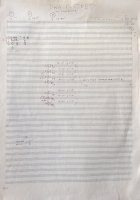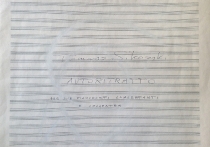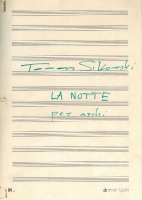In late 1975 and early 1976 Tomasz Sikorski was in New York on a Fulbright scholarship. In the Columbia-Princeton Electronic Music Center he made a quadraphonic recording of a piece entitled meaningfully Solitude of Sounds. The composer did not find many friends in his new environment and spent a lot of time alone, locked in his room. He even planned to return early, but a month-long visit by his wife Natalia helped him survive till the end. Solitude of Sounds was not well received during its premiere (13 March 1976) at the Florida State University in Tallahassee. The piece simply may not have aroused much interest, like Sikorski himself, who quickly established a reputation as a recluse. The Polish premiere of the work took place on 25 September the same year at a Warsaw Autumn concert.
During his stay in the United States Tomasz Sikorski also had an opportunity to present his other works. This may have happened during public programmes as well as tours and meetings, e.g. with the Japanese pianist Aki Takahashi, Piotr Lachert – a friend from the secondary school in Łódź, and the eminent Polish philosopher Leszek Kołakowski, whose personality and views really fascinated Sikorski.
Above all, his stay in the USA clearly made the composer realise how lonely he was. He struggled with the trauma of alienation till the end of his life, though it might have seemed that he constantly build new walls – aware of his fate, he plunged deeper and deeper into loneliness with masochistic cruelty. His impotence, inability to change his life situation caused desperation, which he hid in everyday life and which began to find an outlet in his work. After returning to Warsaw he wrote Sickness unto Death to an extremely pessimistic text by Søren Kierkegaard. One year later the piece was premiered during the 1977 Warsaw Autumn. The performance featured the composer and the brilliant Polish actor Zbigniew Zapasiewicz, who recited the text.
Sickness unto Death was a kind of catharsis, thanks to which Sikorski made further attempts to develop and transform his musical language, though it cannot be said that being preoccupied with creative work had any significant impact on how he perceived his situation in life. After finishing his American scholarship, Sikorski did not return to his work as member of the Warsaw Autumn Repertoire Committee. Having devoted himself entirely to composition, he landed himself in financial trouble. He had no chance of surviving from month to month only by writing music. His only sources of income were state grants and commissions (mainly from the Warsaw Autumn) as well as royalties from performances, which were not numerous, however. This was not sufficient to make a living, even for just one person. Fortunately, his father was always ready to help him get out of any trouble.
The result of nearly two years of work was Music in Twilight – one of Tomasz Sikorski’s best works, drawing on the piano concerto genre. It was premiered at the Warsaw Autumn Festival, on 23 September 1978. The Scottish National Orchestra from Glasgow was conducted by Andrzej Markowski, with the composer appearing as the soloist.
Towards the end of 1979 Sikorski’s music was heard in Saabe, Japan, where Hymnos was premiered by Aki Takahashi on 17 November, and in Athens, at the ISCM Festival. At that time the composer also wrote three pieces for orchestra: Monophony, Lontano and Ostinato. However, for some reason he never sought to have them performed or published. As a result, they were forgotten. Something similar happened with two orchestral compositions written later: Two Portraits and Autoritratto.
For Tomasz Sikorski the 1980s were a time of deepening depression and fight against alcoholism. In addition, he was increasingly plagued by rheumatism, from which he had suffered since childhood. At the 1981 Warsaw Autumn he gave his last public performance, presenting the Polish premiere of Hymnos for piano solo. The introduction of martial law on 13 December 1981 was a huge shock for him. The following morning Szábolcs Esztényi saw his friend Sikorski in Plac Zamkowy. The composer stood in freezing weather, with a shaven head and wearing only a flannel shirt, shouting at passers-by and policemen. His health must have deteriorated also because of the information he received from the Housing Department in September 1979 telling him to leave the flat in Polna Street, as it was to be turned into a Maria Dąbrowska Museum. Sikorski had to move to a flat nearby, at Plac Konstytucji 2, that was three times as small. The turbulence caused by martial law may have been the reason why the museum was not opened until 1984 and why the composer stayed in the flat in ul. Polna until the end of 1982. After the move he complained bitterly about the ‘new’ flat and found it difficult to work there. In addition, he had increasing problems with maintaining discipline in his work and daily rhythm. He suffered from insomnia, would call his friends in the middle of the night and sleep during the day. He went through successive breakdowns and thought he was eavesdropped on. In 1985 he completed no new work. La Notte, which was premiered during the Warsaw Autumn, had been written one year earlier.
22 July 1986 was marked by the death of the composer’s father. Paradoxically, this sad event had a motivating effect on Tomasz Sikorski. He returned to composition, beginning with pieces for cello solo: Moderato Cantabile and The Silence of the Sirens. In 1987 he wrote two more compositions, which were to be his last works: Omaggio per Quattro Pianoforti ed Orchestra in Memoriam Jorge Luis Borges – in a way synthesising Sikorski’s achievements so far – and Diario 87, a very personal and tragic work created at the Polish Radio with the help of Barbara Okoń-Makowska. This was his last creative burst.
The last year of Tomasz Sikorski’s life was a dark time full of despair and doubt, in which the composer was losing the remaining vestiges of control over his life. On 15 January 1988 Wanda Warska and Andrzej Kurylewicz’s Cellar in Warsaw was the venue of a concert featuring Tomasz Sikorski’s music. The composer’s mental state had deteriorated seriously by then and he could not bear the tension associated with the concert. As Andrzej Chłopecki recalls:
Black pessimism provoked sometimes aggressive aversion to his own works – written in hope and listened to in masochistic anger. A chamber concert of his music, which took place in Warsaw in the last year of his life, was marked by an unseemly and to some extent scandalous scene: the composer disturbed the audience listening to his works by making loud comments discrediting his music. He went into raptures only by a quote from Cipriano de Rore’s Calami sonum ferentes used by him in Modus for cello solo.
By that time Sikorski had abandoned composition, as if writing off his own oeuvre or finally becoming resigned to his fate. He did not take part either in the premiere of Omaggio at the Warsaw Autumn, which – contrary to the composer’s fears – was a considerable success, with the piece being encored. Less than two months after this event, on 13 November, Tomasz Sikorski was found dead in his flat. The tragic discovery was made by his ex-wife, Natalia Sikorska. The composer had been dead for a few days. The funeral took place on 22 November in the Stare Powązki cemetery. The composer was buried in his mother’s grave.









